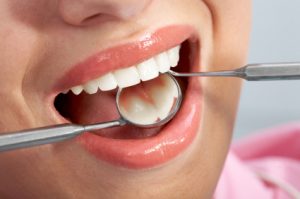No one looks forward and enjoys going to their dentist to have single or multiple teeth extracted. Some people are anxious and uncomfortable sitting in the dentist’s chair for a certain amount of time or even experiencing a painful procedure. However, here at Falls Pointe Dentistry, those concerns were not a problem anymore as your comfort is one of our team’s priorities. In addition, to help you have a comfortable and pain-free as possible tooth extraction experience, we offer local anesthesia and laughing gas medication under sedation dentistry.В
Just like any other procedure, there can be risks and complications that can occur, especially if the guidelines in aftercare is not diligently followed. One of the things that can happen if proper care for the mouth is not established after a tooth extraction procedure is a dry socket.

What is a dry socket?
Following a tooth extraction procedure, a blood clot forms in the area where the tooth has been pulled out. Blood clots are essential in order to seal the area so that it can heal. Dry socket usually occurs when the blood clot breaks down or is dislodged, exposing the bone and nerves. The first five or so days after extraction are the most critical since there is a higher chance that blood clots can dislodge, resulting in a painful dry socket.
Symptoms of dry socket
Usually, the symptoms of dry socket can be easily determined. Here are some of the common symptoms of dry socket:
- Missing blood clot at the extraction site
- Severe pain at the extraction site within three days
- Bad taste in the mouth
- Visible bone at the extraction site
- Bad smelling breath coming from the mouth
- Pain that radiates from the tooth socket to the ear, eye, temple, or neck on the same side
Although experiencing any pain or discomfort is only normal after the removal of the tooth, worsening pain or severe pain is not normal. When any of the mentioned symptoms are observed and if extreme pain does not improve, see your dentist as soon as possible.В
Preventing dry socket
In order to reduce the risk of developing dry socket, you can do these things before your upcoming tooth extraction procedure:
- Quit smoking or using other tobacco products
- Stop taking any other medications that might interfere with blood clotting as directed by your dentist
Also, at home, you can further steps in preventing dry socket after the surgery. Here are some of the following guidelines you may follow to avoid the occurrence of having a dry socket:
- Have plenty of rest after the procedure and avoid any strenuous activities
- Eat a diet of soft foods the day after the surgery
- Be careful when chewing or chewing your meal to avoid disturbing the wound until it has healed
- Drink lots of fluids but avoid carbonated, hot, and alcoholic drinks
- Maintain good oral hygiene, but avoid brushing the in and around the area of the healing wound for the first day following surgery
- Avoid smoking or using any tobacco products for the first few days following the surgery
Looking for a safe and pain-free procedure? Book an appointment by calling us. Falls Pointe Dentistry have caring and dedicated staff to help you feel pleasant during your Teeth Extractions in Raleigh, NC.
